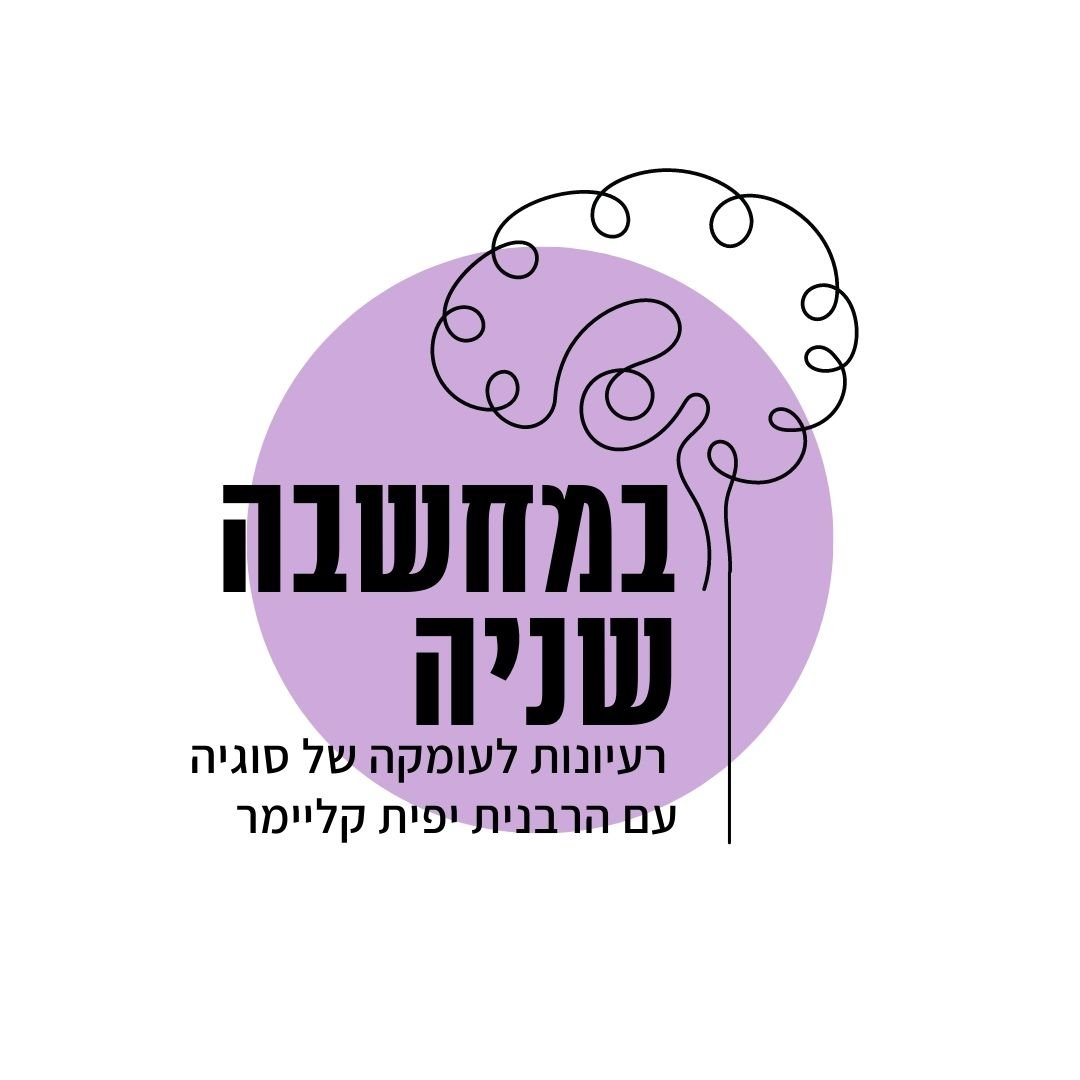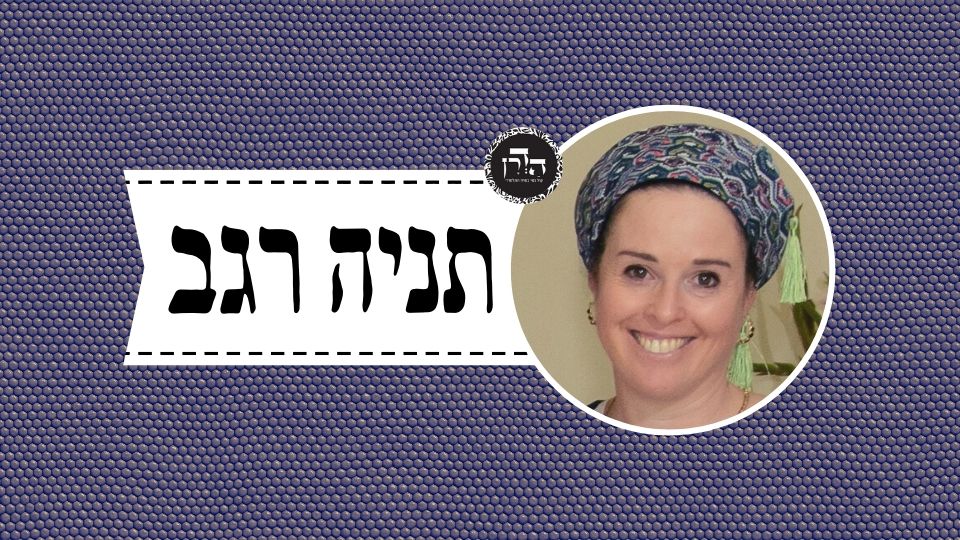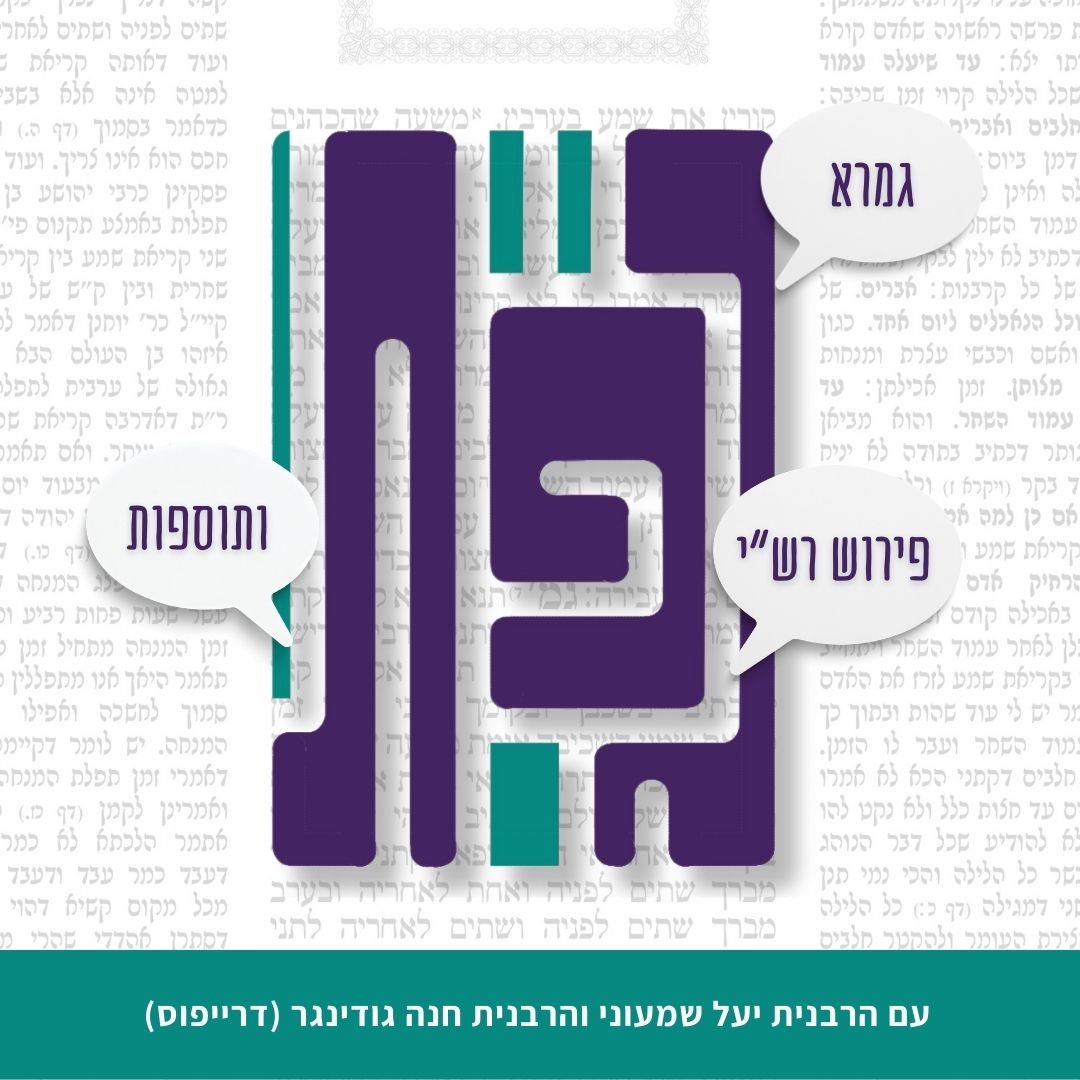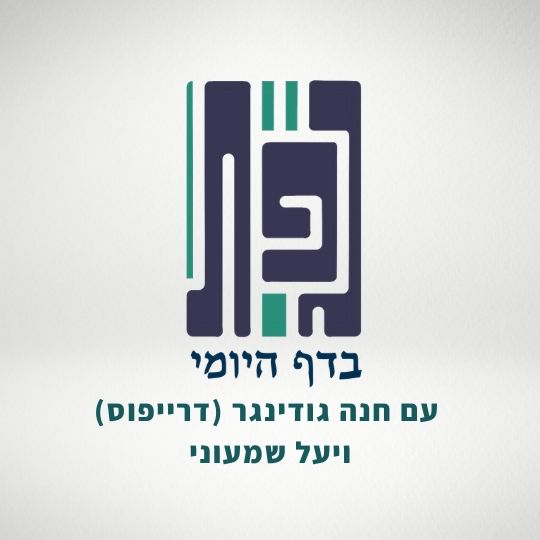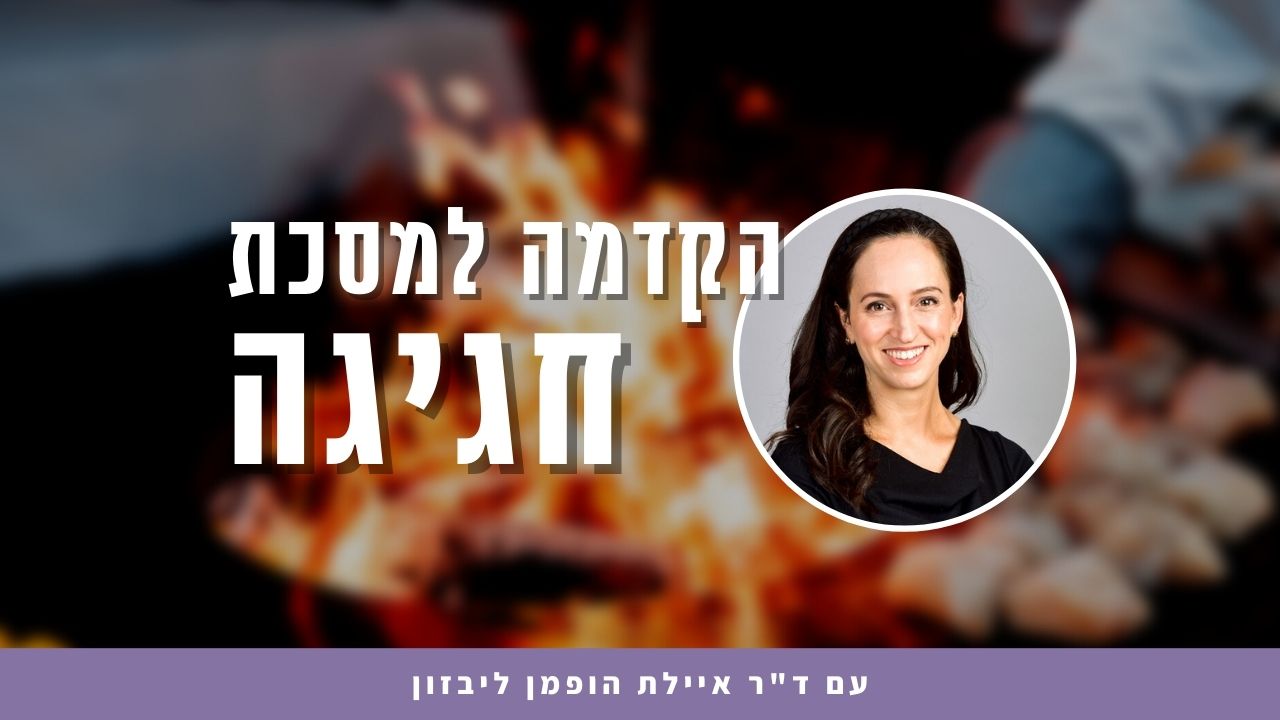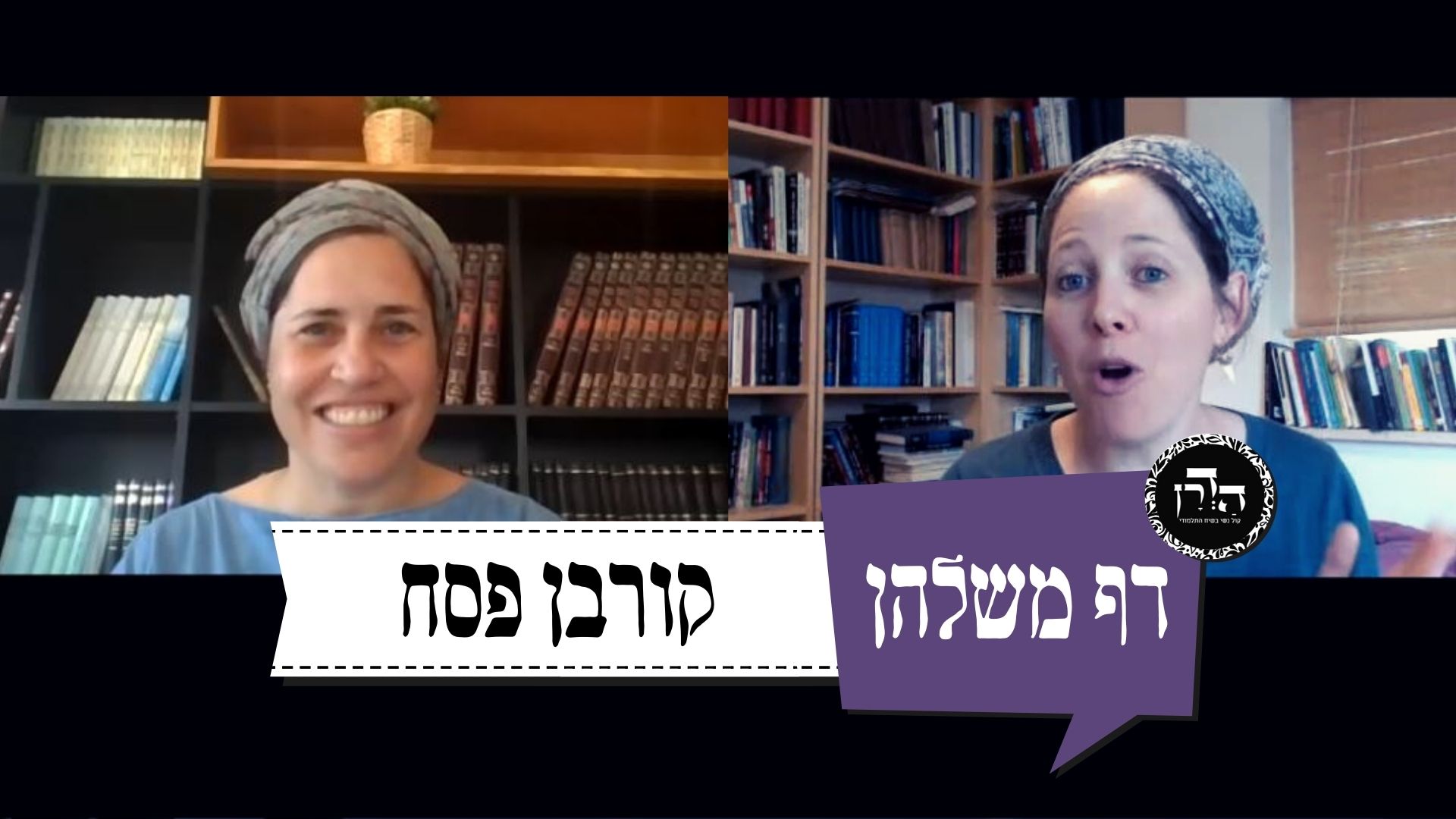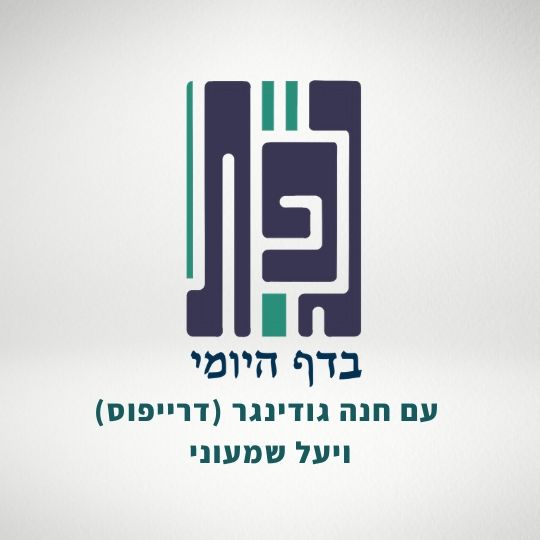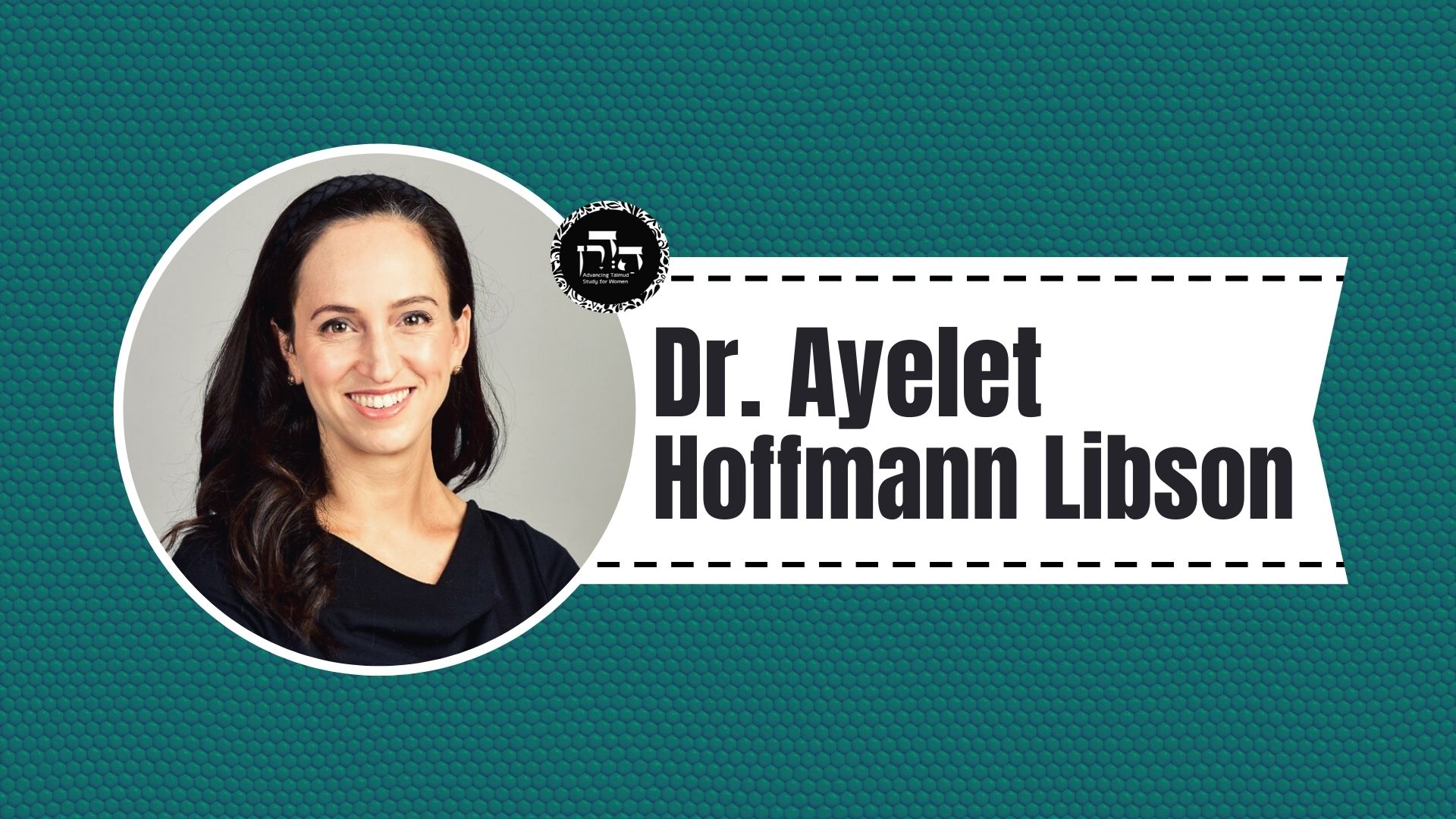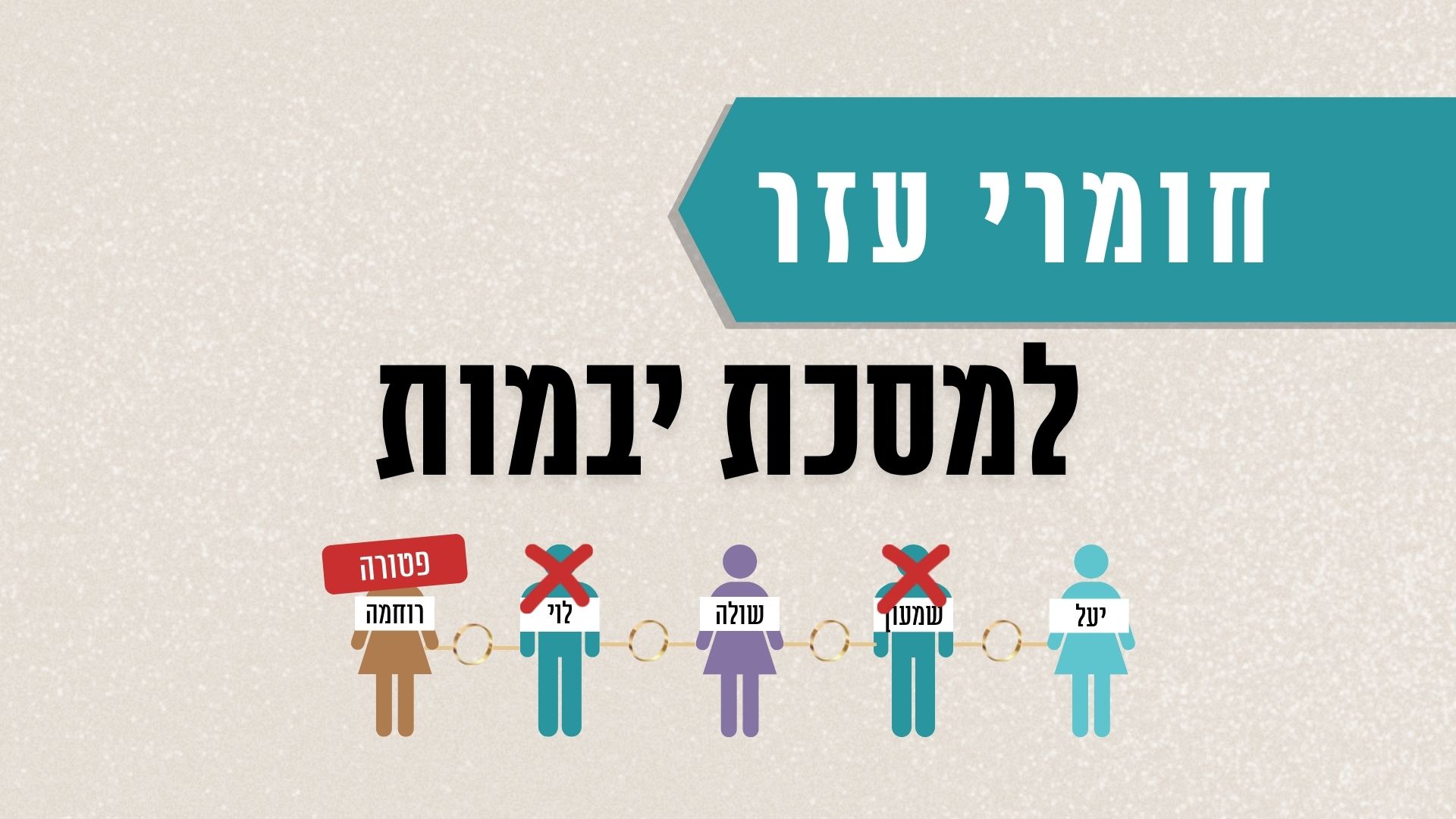למרות שעדיף לנשים להרבות בבדיקות, המשנה אומרת שאין לגברים לבדוק את עצמם משום טומאת קרי כי זה יכול לגרום להוצאת שכבת זרע לבטלה. הגמרא מדברת על חומרת באיסור של הוצאת שכבת זרע לבטלה – גם כי זה מונע ממנו להביא ילדים לעולם וגם כי הוא נותן ליצר הרע להתגבר עליו ובכך יכול להוביל בסופו של דבר לעבודה זרה. איך עושים בדיקות על נשים שאינם מסוגלות לבדוק לעצמן? ומה לגבי כהן שרוצה לאכול תרומה אך לא מסוגל לבדוק לעצמו? רב פפא מסיק מהסוגיה שיש איסור לגברים ללבוש מכנסיים אלא אם כן הם מאוד רחבים בגלל שזה יכול לגרות אותו.
רוצה להקדיש שיעור?
כלים
העמקה
רוצה להבין מה באמת קורה מתחת לפני השטח של הסוגיה?
שיעורים, פודקאסטים והרחבות של מיטב המורות שלנו יפתחו לך עוד זוויות וכיווני חשיבה.
חדשה בלימוד הגמרא?
זה הדף הראשון שלך? איזו התרגשות עצומה! יש לנו בדיוק את התכנים והכלים שיעזרו לך לעשות את הצעדים הראשונים ללמידה בקצב וברמה שלך, כך תוכלי להרגיש בנוח גם בתוך הסוגיות המורכבות ומאתגרות.
פסיפס הלומדות שלנו
גלי את קהילת הלומדות שלנו, מגוון נשים, רקעים וסיפורים. כולן חלק מתנועה ומסע מרגש ועוצמתי.
נדה יג
מַתְנִי’ כׇּל הַיָּד הַמַּרְבָּה לִבְדּוֹק בַּנָּשִׁים — מְשׁוּבַּחַת, וּבָאֲנָשִׁים — תִּקָּצֵץ.
MISHNA: With regard to any hand that is diligent to examine bodily emissions to ascertain ritual impurity, among women such a hand is praiseworthy. But among men such a hand should be severed, as this action is apt to lead to a seminal emission for naught.
גְּמָ’ מַאי שְׁנָא נָשִׁים, וּמַאי שְׁנָא אֲנָשִׁים? נָשִׁים לָאו בְּנוֹת הַרְגָּשָׁה נִינְהוּ — מְשׁוּבָּחוֹת, אֲנָשִׁים דִּבְנֵי הַרְגָּשָׁה נִינְהוּ — תִּקָּצֵץ.
GEMARA: The Gemara asks: What is different about women and what is different about men, that women are praised for examining for bodily emissions while men are castigated for the same? The Gemara answers: Women are not susceptible to sexual arousal by this action, and therefore when a woman is diligent to examine herself she is considered praiseworthy; whereas men, who are susceptible to sexual arousal and may experience a seminal emission as a result of this contact, may not do so, and the hand of a man who conducts frequent examinations for emissions should be severed.
אִי הָכִי מַאי אִירְיָא מַרְבָּה? כִּי לֹא מַרְבָּה נָמֵי! כִּי קָתָנֵי ״מַרְבָּה״ — אֲנָשִׁים.
The Gemara asks: If so, why does the mishna state specifically among men that only the hand that is diligent to examine, i.e., that does so often, should be severed? Even when a man is not diligent to examine, but does so occasionally, this action is also apt to cause a seminal emission. The Gemara answers: When the mishna teaches: Any hand that is diligent to examine, it states this only with regard to women, as men should not examine even occasionally.
תָּנָא: בַּמֶּה דְבָרִים אֲמוּרִים? לְעִנְיַן שִׁכְבַת זֶרַע, אֲבָל לְעִנְיַן זוֹב — אַף הוּא מְשׁוּבָּח כַּנָּשִׁים.
The Gemara continues to discuss the examination of men for seminal emissions. It is taught in a baraita: In what case is this statement, that men should not examine themselves, said? It is said with regard to an examination for semen. But with regard to a man who examines himself for gonorrhea-like discharge [zov], he too is praiseworthy for examining diligently, as women are. The reason is that a man who experiences two such discharges is ritually impure but is not obligated to bring an offering, whereas one who experiences three such emissions must bring an offering as a zav. Therefore, it is important for a man who experiences a gonorrhea-like discharge to examine and count his emissions carefully.
וַאֲפִילּוּ לְעִנְיַן שִׁכְבַת זֶרַע, אִם בָּא לִבְדּוֹק בִּצְרוֹר אוֹ בְּחֶרֶס — בּוֹדֵק.
The baraita adds: And even with regard to semen, if one wants to examine himself with a rock or with a piece of earthenware, which are hard and will not warm the body, he may examine himself in this manner.
וּבְמַטְלֵית לָא? וְהָתַנְיָא: בּוֹדֵק עַצְמוֹ בְּמַטְלֵית וּבְכׇל דָּבָר שֶׁרוֹצֶה! כִּדְאָמַר אַבָּיֵי: בְּמַטְלֵית עָבָה, הָכָא נָמֵי בְּמַטְלֵית עָבָה.
The Gemara asks: And may a man not examine himself with a linen cloth? But isn’t it taught in a baraita: A man may examine himself with a cloth, to see if he has emitted semen, or with any similar item that he wants? The Gemara answers: Just as Abaye said, with regard to a different issue, that it is referring to a coarse cloth, which will not warm one’s body, here too, the baraita is referring to a coarse cloth, which will not lead to a seminal emission.
וְהֵיכָא אִיתְּמַר דְּאַבָּיֵי? אַהָא דִּתְנַן: הָיָה אוֹכֵל בִּתְרוּמָה, וְהִרְגִּישׁ שֶׁנִּזְדַּעְזְעוּ אֵיבָרָיו — אוֹחֵז בְּאַמָּתוֹ, וּבוֹלֵעַ אֶת הַתְּרוּמָה.
The Gemara asks: And where was this statement of Abaye stated? It was stated with regard to that which we learned in a mishna (40a): If a priest was eating teruma and he sensed that his limbs quaked, indicating that a seminal emission was imminent, he should firmly hold his penis to prevent the emission from leaving his body, and swallow the teruma while ritually pure.
אוֹחֵז? וְהָתַנְיָא: רַבִּי אֱלִיעֶזֶר אוֹמֵר: כׇּל הָאוֹחֵז בְּאַמָּתוֹ וּמַשְׁתִּין — כְּאִילּוּ מֵבִיא מַבּוּל לָעוֹלָם! אָמַר אַבָּיֵי: בְּמַטְלֵית עָבָה.
A difficulty was raised with regard to this mishna: May he actually hold his penis? But isn’t it taught in a baraita that Rabbi Eliezer says: With regard to anyone who holds his penis and urinates, it is considered as though he is bringing a flood to the world, as masturbation was one of the sins that led to the flood (Sanhedrin 108b)? Abaye says in resolution of this difficulty that the mishna is referring to one who holds his penis with a coarse cloth.
רָבָא אָמַר: אֲפִילּוּ תֵּימָא בְּמַטְלֵית רַכָּה, כֵּיוָן דַּעֲקַר — עֲקַר, וְאַבָּיֵי חָיֵישׁ דִּלְמָא אָתֵי לְאוֹסוֹפֵי, וְרָבָא לָא חָיֵישׁ דִּלְמָא אָתֵי לְאוֹסוֹפֵי.
Rava says with regard to that mishna: You may even say that it is referring to a priest who holds his penis with a soft cloth, and the reason it is permitted is that once the semen has already been uprooted from his body, it is uprooted, and his subsequent holding of the penis, even with a soft cloth, does not increase the emission of semen. And Abaye prohibits the use of a soft cloth even here, as he is concerned that perhaps due to the contact of this cloth one might come to increase the emission of semen. But Rava is not concerned that perhaps one might come to increase the emission.
וְלָא? וְהָתַנְיָא: הָא לְמָה זֶה דּוֹמֶה? לְנוֹתֵן אֶצְבַּע בָּעַיִן, שֶׁכׇּל זְמַן שֶׁאֶצְבַּע בָּעַיִן — עַיִן מַדְמַעַת וְחוֹזֶרֶת וּמַדְמַעַת!
The Gemara asks: And is Rava not concerned for this possibility? But isn’t it taught in a baraita: To what is this repeated examination of a man comparable? To one who places a finger in his eye, for as long as the finger is in the eye, the eye will tear and continue to tear. Here too, the priest’s action will lead to an increased emission of semen.
וְרָבָא, כֹּל אִחַמּוֹמֵי וַהֲדַר אִחַמּוֹמֵי בְּשַׁעְתֵּיהּ — לָא שְׁכִיחַ.
The Gemara answers: And Rava would claim that if the priest’s limbs were not quaking and the semen was coming out in drops, there is indeed a concern that an examination might increase the emission. But when he feels his limbs quaking, this concern does not apply. The reason is that with regard to any warming of the body that leads to a seminal emission and that is then followed by another warming at the time when the semen is being uprooted, it is uncommon for the latter warming to increase the emission. Consequently, in this case the priest may hold his penis even with a soft cloth.
גּוּפָא, רַבִּי אֱלִיעֶזֶר אוֹמֵר: כׇּל הָאוֹחֵז בָּאַמָּה וּמַשְׁתִּין כְּאִילּוּ מֵבִיא מַבּוּל לָעוֹלָם. אָמְרוּ לוֹ לְרַבִּי אֱלִיעֶזֶר: וַהֲלֹא נִצּוֹצוֹת נִתָּזִין עַל רַגְלָיו, וְנִרְאֶה כִּכְרוּת שׇׁפְכָה, וְנִמְצָא מוֹצִיא לַעַז עַל בָּנָיו שֶׁהֵן מַמְזֵרִים!
The Gemara discusses the matter itself. Rabbi Eliezer says: With regard to anyone who holds his penis and urinates, it is considered as though he is bringing a flood to the world. The Rabbis said to Rabbi Eliezer: But if one does not hold his penis, small drops are sprayed on his legs, and he appears as one whose penis has been severed. A man with that affliction is incapable of fathering children. People who see urine on his legs might suspect that he is suffering from that condition and as a result they will cast aspersions about his children and say that they are children born from a forbidden relationship [mamzerim].
אָמַר לָהֶן: מוּטָב שֶׁיּוֹצִיא לַעַז עַל בָּנָיו שֶׁהֵן מַמְזֵרִים, וְאַל יַעֲשֶׂה עַצְמוֹ רָשָׁע שָׁעָה אַחַת לִפְנֵי הַמָּקוֹם.
Rabbi Eliezer said to them: It is preferable that people cast aspersions about his children that they are mamzerim, and he should not render himself wicked even one moment before the Omnipresent.
תַּנְיָא אִידַּךְ: אָמַר לָהֶן רַבִּי אֱלִיעֶזֶר לַחֲכָמִים, אֶפְשָׁר יַעֲמוֹד אָדָם בְּמָקוֹם גָּבוֹהַּ וְיַשְׁתִּין, אוֹ יַשְׁתִּין בְּעָפָר תִּיחוּחַ, וְאַל יַעֲשֶׂה עַצְמוֹ רָשָׁע שָׁעָה אַחַת לִפְנֵי הַמָּקוֹם.
With regard to the same issue, it is taught in another baraita that Rabbi Eliezer said to the other Rabbis in response: It is possible for one to avoid spraying urine on his legs. How so? Let a person stand on an elevated place and urinate downward, or urinate into an area where there is loose soil, which absorbs the urine, so that it does not ricochet upward, and he should not render himself wicked even one moment before the Omnipresent.
הֵי אֲמַר לְהוּ בְּרֵישָׁא? אִילֵּימָא קַמַּיְיתָא אֲמַר לְהוּ בְּרֵישָׁא, בָּתַר דְּאָמַר לְהוּ אִיסּוּרָא הֲדַר אֲמַר לְהוּ תַּקַּנְתָּא?!
The Gemara asks: Which of these replies did Rabbi Eliezer say to the Rabbis first? If we say that it was the first statement, i.e., that one should not hold his penis even if people might cast aspersions about his children, that he said to the Rabbis first, and subsequently he told them that there was a way to avoid urine being sprayed on his legs, this is difficult; after saying to them that it is a prohibition, would he then say to them a practical remedy? By saying that one can avoid urine being sprayed on his legs, Rabbi Eliezer indicated that if one cannot do so he may hold his penis, which contradicts his other statement.
אֶלָּא, הָא אֲמַר לְהוּ בְּרֵישָׁא, וַאֲמַרוּ לֵיהּ: אֵין לוֹ מָקוֹם גָּבוֹהַּ וְעָפָר תִּיחוּחַ, מַאי? אָמַר לָהֶן: מוּטָב שֶׁיּוֹצִיא לַעַז עַל בָּנָיו, וְאַל יַעֲשֶׂה עַצְמוֹ רָשָׁע שָׁעָה אַחַת לִפְנֵי הַמָּקוֹם.
Rather, clearly he said this practical solution to the Rabbis first, and they then said to him: If one does not have an elevated place or loose earth upon which he can urinate, what should he do? In response to this question, he said to them: It is preferable that people cast aspersions about his children that they are mamzerim, and he should not render himself wicked even one moment before the Omnipresent.
וְכׇל כָּךְ לָמָּה? מִפְּנֵי שֶׁמּוֹצִיא שִׁכְבַת זֶרַע לְבַטָּלָה, דְּאָמַר רַבִּי יוֹחָנָן: כׇּל הַמּוֹצִיא שִׁכְבַת זֶרַע לְבַטָּלָה חַיָּיב מִיתָה, שֶׁנֶּאֱמַר: ״וַיֵּרַע בְּעֵינֵי ה׳ (אֶת) אֲשֶׁר עָשָׂה וַיָּמֶת גַּם אוֹתוֹ״.
The Gemara asks: And why must one refrain to that extent from holding his penis? Because as the result of holding his penis he might emit semen for naught. As Rabbi Yoḥanan says: Anyone who emits semen for naught is liable to receive the punishment of death at the hand of Heaven, as it is stated with regard to Onan, son of Judah: “And it came to pass, when he engaged in intercourse with his brother’s wife, that he spilled it on the ground, lest he should give seed to his brother. And the thing that he did was evil in the eyes of the Lord, and He slew him also” (Genesis 38:9–10).
רַבִּי יִצְחָק וְרַבִּי אַמֵּי אָמְרִי: כְּאִילּוּ שׁוֹפֵךְ דָּמִים, שֶׁנֶּאֱמַר: ״הַנֵּחָמִים בָּאֵלִים תַּחַת כׇּל עֵץ רַעֲנָן שׁוֹחֲטֵי הַיְלָדִים בַּנְּחָלִים תַּחַת סְעִיפֵי הַסְּלָעִים״, אַל תִּקְרֵי ״שׁוֹחֲטֵי״ אֶלָּא ״סוֹחֲטֵי״.
Rabbi Yitzḥak and Rabbi Ami say: One who emits semen for naught is considered as though he sheds blood, as it is stated: “But draw near here, you sons of the sorceress, the seed of the adulterer and the harlot…Are you not children of transgression, a seed of falsehood, you that inflame yourselves among the terebinths, under every leafy tree, that slay [shoḥatei] the children in the valleys, under the clefts of the rocks?” (Isaiah 57:3–5). Do not read this word as shoḥatei; rather, read it as soḥatei, i.e., one who squeezes out [soḥet] semen is considered to have shed the blood of the children who could have been born from that seed.
רַב אַסִּי אָמַר: כְּאִילּוּ עוֹבֵד עֲבוֹדָה זָרָה, כְּתִיב הָכָא ״תַּחַת כׇּל עֵץ רַעֲנָן״, וּכְתִיב הָתָם ״עַל הֶהָרִים הָרָמִים וְתַחַת כׇּל עֵץ רַעֲנָן״.
Rav Asi says: It is considered as though he worships idols, as it is written here: “Under every leafy tree,” and it is written there, with regard to the mitzva of eradicating idols from Eretz Yisrael: “You shall destroy all the places, where the nations that you are to dispossess worshipped their gods, upon the high mountains, and upon the hills, and under every leafy tree” (Deuteronomy 12:2).
רַב יְהוּדָה וּשְׁמוּאֵל הֲווֹ קָיְימִי אַאִיגָּרָא דְּבֵי כְּנִישְׁתָּא דְּשָׁף וִיתֵיב בִּנְהַרְדְּעָא. אֲמַר לֵיהּ רַב יְהוּדָה לִשְׁמוּאֵל: צָרִיךְ אֲנִי לְהַשְׁתִּין. אֲמַר לֵיהּ: שִׁינָּנָא, אֱחוֹז בַּאֲמָתְךָ וְהַשְׁתֵּן לַחוּץ.
§ With regard to the issue of holding one’s penis for the purpose of urinating, the Gemara relates that Rav Yehuda and Shmuel were standing on the roof of the synagogue that was destroyed and rebuilt in Neharde’a. Rav Yehuda said to Shmuel: What can I do? I need to urinate. Shmuel said to him: Shinnana, hold your penis, so that the water does not fall onto the synagogue roof, and urinate outward, away from the synagogue.
הֵיכִי עָבֵיד הָכִי? וְהָתַנְיָא: רַבִּי אֱלִיעֶזֶר אוֹמֵר: כׇּל הָאוֹחֵז בְּאַמָּתוֹ וּמַשְׁתִּין — כְּאִילּוּ מֵבִיא מַבּוּל לָעוֹלָם!
The Gemara asks: How could Rav Yehuda do so? But isn’t it taught in a baraita that Rabbi Eliezer says: With regard to anyone who holds his penis and urinates, it is considered as though he is bringing a flood to the world?
אָמַר אַבָּיֵי: עֲשָׂאוֹ כְּבוֹלֶשֶׁת, דִּתְנַן: בּוֹלֶשֶׁת (שנכנס) [שֶׁנִּכְנְסָה] לָעִיר, בִּשְׁעַת שָׁלוֹם — חָבִיּוֹת פְּתוּחוֹת אֲסוּרוֹת, סְתוּמוֹת מוּתָּרוֹת, בִּשְׁעַת מִלְחָמָה — אֵלּוּ וְאֵלּוּ מוּתָּרוֹת, לְפִי שֶׁאֵין לָהֶן פְּנַאי לְנַסֵּךְ. אַלְמָא: דְּכֵיוָן דִּבְעִיתִי לָא אָתֵי לְנַסּוֹכֵי, הָכָא נָמֵי: כֵּיוָן דִּבְעִיתִי לָא אָתֵי לְהַרְהוֹרֵי.
Abaye says: The Sages rendered the halakhic status of this situation like that of a troop of marauders, as we learned in a mishna (Avoda Zara 70b): With regard to a troop of marauders that entered a town, if they did so in a time of peace, open casks of wine are forbidden, in case the marauders used the wine for libations in idol worship, whereas sealed casks are permitted. In a time of war, both these and those are permitted, because the marauders do not have leisure to pour libations. Evidently, since these marauders are afraid, they will not come to pour libations. Here too, in this incident involving Rav Yehuda, since he is afraid he will not come to have sexual thoughts.
וְהָכָא מַאי בְּעִיתוּתָא אִיכָּא? אִיבָּעֵית אֵימָא: בִּיעֲתוּתָא דְּלֵילְיָא וּדְאִיגָּרָא, וְאִיבָּעֵית אֵימָא: בִּיעֲתוּתָא דְּרַבֵּיהּ, וְאִיבָּעֵית אֵימָא: בִּיעֲתוּתָא דִּשְׁכִינָה, וְאִיבָּעֵית אֵימָא: אֵימְתָא דְּמָרֵיהּ עֲלֵיהּ, דְּקָרֵי שְׁמוּאֵל עֲלֵיהּ: ״אֵין זֶה יְלוּד אִשָּׁה״.
The Gemara asks: And what fear is there here, in the case of Rav Yehuda? The Gemara explains: If you wish, say that there is the fear of the night and of the roof, i.e., that he might fall. And if you wish, say that the awe of his teacher, Shmuel, is upon him. And if you wish, say that the awe of the Divine Presence that dwells in the synagogue is upon Rav Yehuda. And if you wish, say that the awe of his Master, God, is upon him. Rav Yehuda was renowned for his fear of Heaven, as Shmuel declared about him: This one is not born of a woman, but is like an angel.
וְאִיבָּעֵית אֵימָא: נָשׂוּי הֲוָה, דְּאָמַר רַב נַחְמָן: אִם הָיָה נָשׂוּי — מוּתָּר.
And if you wish, say a different answer, that Rav Yehuda was allowed to hold his penis while urinating because he was married; as Rav Naḥman said: If one is married, it is permitted for him to hold his penis while urinating, as his improper sexual urges are not as strong.
וְאִיבָּעֵית אֵימָא, כִּי הָא אוֹרִי לֵיהּ, דְּתָנֵי אַבָּא בְּרֵיהּ דְּרַבִּי בִּנְיָמִין בַּר חִיָּיא: אֲבָל מְסַיֵּיעַ בַּבֵּיצִים מִלְּמַטָּה. וְאִיבָּעֵית אֵימָא, כִּי הָא אוֹרִי לֵיהּ, דְּאָמַר רַבִּי אֲבָהוּ אָמַר רַבִּי יוֹחָנָן: גְּבוּל יֵשׁ לוֹ, מֵעֲטָרָה וּלְמַטָּה – מוּתָּר,
And if you wish, say that Shmuel ruled for Rav Yehuda in accordance with this baraita, which Abba, son of Rabbi Binyamin bar Ḥiyya, teaches: One may not hold the penis itself while urinating, but a man who wishes to urinate may assist the process by holding the testicles from below. Shmuel instructed Rav Yehuda to act in this manner. And if you wish, say that Shmuel ruled for Rav Yehuda in accordance with that which Rabbi Abbahu said that Rabbi Yoḥanan says: There is a clear demarcation in the prohibition against holding one’s penis while urinating: From the corona and below, toward the tip of the penis, it is permitted to hold, as this will not lead to arousal.
מֵעֲטָרָה וּלְמַעְלָה — אָסוּר.
From the corona and above, toward the body, it is prohibited.
אָמַר רַב: הַמְקַשֶּׁה עַצְמוֹ לְדַעַת — יְהֵא בְּנִדּוּי. וְלֵימָא ״אָסוּר״! דְּקָמְגָרֵי יֵצֶר הָרַע אַנַּפְשֵׁיהּ. וְרַבִּי אַמֵּי אָמַר: נִקְרָא ״עֲבַרְיָין״, שֶׁכָּךְ אוּמָּנֻתוֹ שֶׁל יֵצֶר הָרַע: הַיּוֹם אוֹמֵר לוֹ ״עֲשֵׂה כָּךְ״, וּלְמָחָר אוֹמֵר לוֹ ״עֲשֵׂה כָּךְ״, וּלְמָחָר אוֹמֵר לוֹ ״לֵךְ עֲבוֹד עֲבוֹדָה זָרָה״ — וְהוֹלֵךְ וְעוֹבֵד.
§ Rav says: One who intentionally causes himself an erection shall be ostracized. The Gemara suggests: And let Rav say simply that it is prohibited. The Gemara explains that it is proper to ostracize such a man, as he arouses the evil inclination upon himself. And Rabbi Ami says: He is called a habitual transgressor, as this is the craft of the evil inclination. Today he says to a person: Do this sin, and when the individual obeys his inclination, on the following day the evil inclination says to him: Do that sin, and on the following day he says to him: Go and worship idols, and he goes and worships idols.
אִיכָּא דְאָמְרִי, אָמַר רַבִּי אַמֵּי: כׇּל הַמֵּבִיא עַצְמוֹ לִידֵי הִרְהוּר — אֵין מַכְנִיסִין אוֹתוֹ בִּמְחִיצָתוֹ שֶׁל הַקָּדוֹשׁ בָּרוּךְ הוּא. כְּתִיב הָכָא: ״וַיֵּרַע בְּעֵינֵי ה׳״, וּכְתִיב הָתָם: ״כִּי לֹא אֵל חָפֵץ רֶשַׁע אָתָּה לֹא יְגוּרְךָ רָע״.
Some say that Rabbi Ami says: With regard to anyone who brings himself into a state of arousal, they do not bring him within the boundary of the Holy One, Blessed be He. The proof is that it is written here, with regard to Onan, son of Judah: “And the thing that he did was evil in the eyes of the Lord, and He slew him also” (Genesis 38:10), and it is written there: “For You are not a God who has pleasure in wickedness; evil shall not sojourn with You. The boasters shall not stand in Your sight…But as for me, in the abundance of Your kindness will I come into Your house; I will bow down toward Your holy Temple in fear of You” (Psalms 5:5–8). This demonstrates that whoever does evil, like Onan, shall not sojourn with God.
וְאָמַר רַבִּי אֶלְעָזָר: מַאי דִכְתִיב ״יְדֵיכֶם דָּמִים מָלֵאוּ״? אֵלּוּ הַמְנָאֲפִים בַּיָּד. תָּנָא דְּבֵי רַבִּי יִשְׁמָעֵאל: ״לֹא תִנְאָף״ — לֹא תְּהֵא (בְּךָ נִיאוּף) [נוֹאֵף], בֵּין בַּיָּד בֵּין בָּרֶגֶל.
And Rabbi Elazar says, with regard to the severity of this transgression: What is the meaning of that which is written: “And when you spread forth your hands, I will hide My eyes from you; even when you make many prayers, I will not hear; your hands are full of blood” (Isaiah 1:15)? These are those men who commit adultery with the hand, by masturbating. Likewise, the school of Rabbi Yishmael taught: When it is stated in the Ten Commandments: “You shall not commit adultery” (Exodus 20:13), this means that there shall not be adultery among you, whether you masturbate by hand or whether with one’s foot.
תָּנוּ רַבָּנַן: הַגֵּרִים וְהַמְשַׂחֲקִין בְּתִינוֹקוֹת — מְעַכְּבִין אֶת הַמָּשִׁיחַ. בִּשְׁלָמָא גֵּרִים — כִּדְרַבִּי חֶלְבּוֹ, דְּאָמַר רַבִּי חֶלְבּוֹ: ״קָשִׁין גֵּרִים לְיִשְׂרָאֵל כְּסַפַּחַת״, אֶלָּא מְשַׂחֲקִין בַּתִּינוֹקוֹת מַאי הִיא?
§ The Sages taught in a baraita: Converts and those who play with children delay the coming of the Messiah. The Gemara asks: Granted with regard to converts, this is in accordance with the opinion of Rabbi Ḥelbo, as Rabbi Ḥelbo says: Converts are as harmful to the Jewish people as a leprous scab on the skin, as they are not proficient in the performance of the mitzvot and born Jews learn from them. But with regard to the category of those who play with children, to what is it referring?
אִילֵימָא מִשְׁכַּב זְכוּר — בְּנֵי סְקִילָה נִינְהוּ! אֶלָּא דֶּרֶךְ אֵבָרִים — בְּנֵי מַבּוּל נִינְהוּ!
If we say that this is referring to homosexuality, such men are liable to be executed by stoning, and their behavior is criticized not simply because they delay the Messiah. Rather, one might suggest that this is referring to those who emit semen by way of other limbs, i.e., without engaging in intercourse; if so, they are considered as though they are bringing a flood, and are therefore liable to be punished themselves with a flood.
אֶלָּא דְּנָסְיבִי קְטַנּוֹת, דְּלָאו בְּנוֹת אוֹלוֹדֵי נִינְהוּ, דְּאָמַר רַבִּי יוֹסֵי: אֵין בֶּן דָּוִד בָּא עַד שֶׁיִּכְלוּ כׇּל הַנְּשָׁמוֹת שֶׁבַּגּוּף, שֶׁנֶּאֱמַר: ״כִּי רוּחַ מִלְּפָנַי יַעֲטוֹף וּנְשָׁמוֹת אֲנִי עָשִׂיתִי״.
Rather, the baraita means that they marry minor girls who are not yet capable of bearing children, consequently emitting semen for naught. As Rabbi Yosei said: The Messiah, son of David, will not come until all the souls of the body have been finished, i.e., until all souls that are destined to inhabit physical bodies do so. As it is stated: “For the spirit that enwraps itself is from Me, and the souls that I have made” (Isaiah 57:16). The verse is interpreted as follows: The spirit, i.e., the souls about which it has been decreed by Me that they are to be born, if they are not born, they enwrap the Messiah and prevent him from coming.
בָּאֲנָשִׁים תִּקָּצֵץ. אִיבַּעְיָא לְהוּ: דִּינָא תְּנַן אוֹ לָטוּתָא תְּנַן? דִּינָא תְּנַן, כִּי הָא דְּרַב הוּנָא קַץ יְדָא, אוֹ לָטוּתָא תְּנַן?
§ The mishna teaches that with regard to any hand that is diligent to examine bodily emissions, among men, such a hand should be severed. A dilemma was raised before the Sages: Do we learn this statement as a practical halakha, i.e., that the court should actually sever his hand, or do we learn it as a mere curse, but not as an actual instruction to punish him in that manner? The Gemara elaborates: Do we learn it as a practical halakha like that prohibition against striking another, in which the same expression is used: With regard to anyone who raises his hand upon another, his hand should be severed, and Rav Huna indeed acted accordingly and severed the hand of an offender? Or perhaps do we learn it as a mere curse?
תָּא שְׁמַע, דְּתַנְיָא: רַבִּי טַרְפוֹן אוֹמֵר: יָד לָאַמָּה — תִּקָּצֵץ יָדוֹ עַל טַבּוּרוֹ. אָמְרוּ לוֹ: יָשַׁב לוֹ קוֹץ בִּכְרֵיסוֹ, לֹא יִטְּלֶנּוּ?! אָמַר לָהֶן: לֹא. וַהֲלֹא כְּרֵיסוֹ נִבְקַעַת! אָמַר לָהֶן: מוּטָב תִּבָּקַע כְּרֵיסוֹ, וְאַל יֵרֵד לִבְאֵר שַׁחַת.
The Gemara suggests: Come and hear, as it is taught in a baraita that Rabbi Tarfon says: If one’s hand goes to his penis, his hand should be severed upon his navel. The Rabbis said to him: If so, in a case where a thorn was stuck in one’s belly, should he not remove it? Rabbi Tarfon said to them: Indeed, he should not remove it, and if he does so his hand should be severed. The Rabbis replied: But if his hand is severed while it is upon his navel, won’t his belly be split open? Rabbi Tarfon said to them: It is preferable that the belly of one who acts in this manner should be split open, and he should not descend into the pit of destruction.
אִי אָמְרַתְּ בִּשְׁלָמָא דִּינָא תְּנַן, הַיְינוּ דְּאָמְרִי: ״וַהֲלֹא כְּרֵיסוֹ נִבְקַעַת״, אֶלָּא אִי אָמְרַתְּ לָטוּתָא תְּנַן, מַאי ״כְּרֵיסוֹ נִבְקַעַת״? אֶלָּא מַאי דִּינָא תְּנַן, לָא סַגִּי דְּלָאו עַל טַבּוּרוֹ?
The Gemara analyzes this discussion: Granted, if you say that we learn the statement in the mishna as a practical halakha, this is the meaning of that which the Rabbis said: But if his hand is severed upon his navel, won’t his belly be split open? But if you say that we learn the statement in the mishna as a mere curse, what is the meaning of the phrase: Won’t his belly be split open? The Gemara responds: Rather, what explanation is the alternative? That we learn the mishna as stating a practical halakha? That would not explain the exchange between the Rabbis to Rabbi Tarfon, because is it not sufficient that the hand be severed not upon his navel? In other words, even if the hand must actually be severed, it is not clear why it should be severed while it is upon his navel.
אֶלָּא הָכִי קָאָמַר רַבִּי טַרְפוֹן: כׇּל הַמַּכְנִיס יָדוֹ לְמַטָּה מִטַּבּוּרוֹ — תִּקָּצֵץ. אָמְרוּ לוֹ לְרַבִּי טַרְפוֹן: יָשַׁב לוֹ קוֹץ בִּכְרֵיסוֹ לֹא יִטְּלֶנּוּ?! אָמַר לָהֶן: לֹא. וַהֲלֹא כְּרֵיסוֹ נִבְקַעַת! אָמַר לָהֶן: מוּטָב תִּבָּקַע כְּרֵיסוֹ, וְאַל יֵרֵד לִבְאֵר שַׁחַת.
Rather, this is what Rabbi Tarfon is saying: With regard to anyone who inserts his hand below his navel, his hand should be severed. The Rabbis said to Rabbi Tarfon: If a thorn was stuck in one’s belly, should he not remove it? Rabbi Tarfon said to them: He should not. They responded: But won’t his belly be split open due to the thorn? Rabbi Tarfon said to them: It is preferable that his belly be split open, and he should not descend into the pit of destruction.
מַתְנִי’ הַחֵרֶשֶׁת, וְהַשּׁוֹטָה, וְהַסּוֹמָא, וְשֶׁנִּטְרְפָה דַּעְתָּהּ — אִם יֵשׁ לָהֶם פִּקְּחוֹת, מְתַקְּנוֹת אוֹתָן, וְהֵן אוֹכְלוֹת בִּתְרוּמָה.
MISHNA: In the case of a woman who is deaf [haḥereshet], or an imbecile, or blind, or who went insane, and is therefore unable to examine herself reliably, if such women have competent friends, those friends prepare them by examining them and immersing them in a ritual bath. And on that basis the incompetent women may partake of teruma after the sun sets.
גְּמָ’ חֵרֶשֶׁת — אִיהִי תִּבְדּוֹק לְנַפְשַׁהּ! דְּתַנְיָא, אָמַר רַבִּי: חֵרֶשֶׁת הָיְתָה בִּשְׁכוּנָתֵינוּ, לֹא דַּיָּה שֶׁבּוֹדֶקֶת לְעַצְמָהּ, אֶלָּא שֶׁחַבְרוֹתֶיהָ רוֹאוֹת וּמַרְאוֹת לָהּ!
GEMARA: The mishna states that competent women must assist a deaf woman. The Gemara asks: Let her examine herself; as it is taught in a baraita that Rabbi Yehuda HaNasi said: There was a deaf woman in our neighborhood who was so proficient in these matters that not only did she examine herself, but when her friends would see stains similar to blood and were unsure whether or not the stains were ritually impure, they would show her the stains.
הָתָם — בִּמְדַבֶּרֶת וְאֵינָהּ שׁוֹמַעַת, הָכָא — בְּשֶׁאֵינָהּ מְדַבֶּרֶת וְאֵינָהּ שׁוֹמַעַת, כְּדִתְנַן: חֵרֵשׁ שֶׁדִּבְּרוּ חֲכָמִים בְּכׇל מָקוֹם — אֵינוֹ שׁוֹמֵעַ וְאֵינוֹ מְדַבֵּר.
The Gemara answers: There, Rabbi Yehuda HaNasi is referring to a woman who can speak but cannot hear. It is possible for such a woman to be an expert in examining blood. But here, the mishna is dealing with a woman who can neither speak nor hear, and she is therefore considered incompetent and incapable of examining herself. As we learned in a mishna (Terumot 1:2): The deaf person of whom the Sages spoke everywhere is one who can neither hear nor speak, i.e., a deaf-mute.
הַסּוֹמָא — אִיהִי תִּבְדּוֹק לְנַפְשַׁהּ, וְתַיחְזֵי לַחֲבִירְתַּהּ! אָמַר רַבִּי יוֹסֵי בְּרַבִּי חֲנִינָא: סוֹמָא אֵינָהּ מִשְׁנָה.
§ The mishna further teaches that competent women must assist a blind woman. The Gemara similarly asks: Let her examine herself and show the cloth to her friend. Rabbi Yosei, son of Rabbi Ḥanina, says: The correct version of the mishna does not mention a blind woman.
וְשֶׁנִּטְרְפָה דַּעְתָּהּ — הַיְינוּ שׁוֹטָה! שֶׁנִּטְרְפָה דַּעְתָּהּ מֵחֲמַת חוֹלִי.
§ The mishna also states that competent women must assist a woman who went insane. The Gemara asks: With regard to her ability to examine herself, isn’t this the same as an imbecile, who is already mentioned in the mishna? The Gemara answers: Here, the mishna is referring to a woman who went insane due to illness, which is a different category than that of an imbecile.
תָּנוּ רַבָּנַן: כֹּהֵן שׁוֹטֶה — מַטְבִּילִין אוֹתוֹ, וּמַאֲכִילִין אוֹתוֹ תְּרוּמָה לָעֶרֶב, וּמְשַׁמְּרִין אוֹתוֹ שֶׁלֹּא יִישַׁן. יָשַׁן — טָמֵא, לֹא יָשַׁן — טָהוֹר.
The Gemara further discusses halakhot pertaining to an imbecile. The Sages taught in a baraita: With regard to an imbecile priest who was ritually impure, competent men deal with his purification: They immerse him, and then enable him to partake of teruma in the evening, like any other priest who was impure. And those taking care of him must watch over him to ensure that he does not sleep before he partakes of teruma, in case he experiences a seminal emission, which would render him impure. If he slept, he is once again impure, and may not partake of teruma; if he did not sleep he is pure.
רַבִּי אֱלִיעֶזֶר בְּרַבִּי צָדוֹק אוֹמֵר: עוֹשִׂין לוֹ כִּיס שֶׁל עוֹר. אָמְרוּ לוֹ: כׇּל שֶׁכֵּן שֶׁמֵּבִיא לִידֵי חִימּוּם! אָמַר לָהֶן: לְדִבְרֵיכֶם, שׁוֹטֶה אֵין לוֹ תַּקָּנָה.
Rabbi Eliezer, son of Rabbi Tzadok, says that there is another method of allowing an imbecile priest to partake of teruma: One prepares for him a leather pouch, which is wrapped around his penis, and before giving him teruma to partake of one checks this pouch to see if he has emitted semen. The other Sages said to him: It is improper to do this, as all the more so he will be prevented from partaking of teruma; this pouch warms him and increases the likelihood of a seminal emission. Rabbi Eliezer, son of Rabbi Tzadok, said to them: According to your statement, an imbecile priest has no remedy that will enable him to partake of teruma.
אָמְרוּ לוֹ: לִדְבָרֵינוּ — יָשַׁן טָמֵא, לֹא יָשַׁן טָהוֹר; לִדְבָרֶיךָ — שֶׁמָּא יִרְאֶה טִפָּה כְּחַרְדָּל, וְתִבָּלַע בַּכִּיס!
They said to him: According to our statement there is a way he can partake of teruma, as stated above: If he slept, he is impure; if he did not sleep he is pure. But according to your statement, that one wraps a pouch around his penis, this is not a reliable method, as perhaps he will see, i.e., experience the emission of, a drop of semen as small as a mustard seed, and it will be absorbed in the pouch and will not be noticed, which would mean that he is eating teruma in a state of ritual impurity.
תָּנָא מִשּׁוּם רַבִּי אֶלְעָזָר אָמְרוּ: עוֹשִׂין לוֹ כִּיס שֶׁל מַתֶּכֶת.
The Gemara continues to discuss the methods by which an imbecile priest can partake of teruma. It was taught in a baraita that the Sages said in the name of Rabbi Elazar: One prepares for him a metal pouch, which is placed on his penis and does not warm it.
אָמַר אַבָּיֵי: וְשֶׁל נְחֹשֶׁת, כִּדְתַנְיָא: רַבִּי יְהוּדָה אוֹמֵר: רוֹאִין אוֹתָן גִּבְעוֹלִין שֶׁל אֵזוֹב כְּאִילּוּ הֵן שֶׁל נְחֹשֶׁת.
In explanation of this statement, Abaye says: And when this tanna speaks of metal, he means that the pouch should be made of copper, which does not absorb liquid, and therefore any drop of semen would be visible. This is as it is taught in a mishna (Para 12:5), with regard to the amount of water of purification that must be sprinkled on an individual who is impure due to impurity imparted by a corpse, that Rabbi Yehuda says: One considers those hyssop stems, with which the waters of purification are sprinkled, as though they are made of copper, which does not absorb any of the water.
אָמַר רַב פָּפָּא: שְׁמַע מִינַּהּ מִכְנָסַיִם אֲסוּרִים, וְהָכְתִיב: ״וַעֲשֵׂה לָהֶם מִכְנְסֵי בָד לְכַסּוֹת בְּשַׂר עֶרְוָה״!
Rav Pappa says: One can learn from the statement of the Rabbis that a pouch wrapped around one’s penis can warm it enough to cause a seminal emission, that trousers are prohibited to be worn, as they too warm the penis, by being placed so they are tight against it. The Gemara asks: But isn’t it written with regard to the priestly garments: “And you shall make them linen trousers to cover the flesh of their nakedness, from the loins even to the thighs they shall reach” (Exodus 28:42)?
הָהוּא, כִּדְתַנְיָא: מִכְנְסֵי כֹהֲנִים לְמָה הֵן דּוֹמִין? כְּמִין פְּמָלַנְיָא שֶׁל פָּרָשִׁים, לְמַעְלָה — עַד מׇתְנַיִם, לְמַטָּה — עַד יְרֵכַיִם, וְיֵשׁ לָהֶם שְׁנָצִים, וְאֵין לָהֶם לֹא בֵּית הַנֶּקֶב וְלֹא בֵּית הָעֶרְוָה.
The Gemara explains: That garment, the trousers worn by priests, was different, as it is taught in a baraita: The trousers of priests, to what are they comparable? They are similar to riding trousers [pamalanya] of horsemen, and this is what they look like: Above, they reach up to the loins; below, they go down to the thighs, and they have straps, and they have no opening, neither at the back nor at the front.
אָמַר אַבָּיֵי:
Abaye says:


